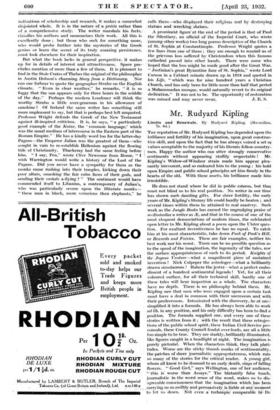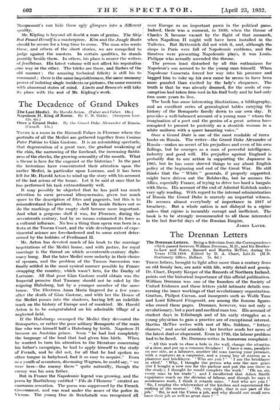Mr. Rudyard Kipling
THE reputation of Mr. Rudyard Kipling has depended-upon the brilliance and fertility of his imagination, upon great construc- tive skill, and upon the fact that he has alwayi voiced a set of values acceptable to the majority of his literate fellow-country- men. Happy the author who can utter strongly conservative sentiments without appearing stuffily respectable ! Mr. Kipling's Widow-of-Windsor strain made him appear plea- santly irreverent, and so endeared him to the young : his hold upon Empire and public school principles set him firmly in the hearts of the old. With these assets, his brilliance made him irresistible.
He does not stand where he did in public esteem, but that must not blind us to his real position. No writer in our time has shown such dazzling gifts. For sheer fertility, the early years of Mr. Kipling's literary life could hardly be beaten ; and several times within them he attained to real mastery. Such work as the Jungle Books has earned the ungrudging praise of so dissimilar a writer as YE, and that in the course of one of the most eloquent denunciations of modern times, the celebrated open letter to Mr. Kipling about a poem upon the Ulster ques- tion. For exultant inventiveness he has no equal. To catch him at his most characteristic, take down. Puck of Prudes Hill, or Rewards and Fairies. These are fair examples, neither his best work nor his worst. There can be no possible question as to the speed of the imagination, the ingenuity of the tales, nor the surface appropriateness of each to its period. Knights of the Joyous Venture—what a magnificent piece of sustained invention ! Nick Culpeper the astrologer—what a brilliantly drawn simulacrum ! Rahere the jester—what a perfect embo- diment of a hundred sentimental legends ! Yet, for all their coloured surface, for all their technical skill, hardly one of these tales will bear inspection as a whole. The characters have no depth. There is no philosophy behind them. Mr, Kipling, saw that men who were engaged upon a certain task must have a deal in common with their successors .and with their predecessors. Intoxicated with the discovery, he at one.. simplified it into a formula. He has always been able to work ad lib. in any position, and his only difficulty has been to find a position. The formula supplied one, and every one of these stories is written from it ; with the result that these retrojec- tions of the public school spirit, these Indian Civil Service prO- consuls, these County Council feudal over-lords, are all a little too simple to be true. They are starkly, brilliantly illuminated, like figures caught in a headlight at night. The imagination is purely pictorial. When the characters think, they talk plati- tudes. Worse are the sticky thumb marks of sentimentality, the patches of sheer journalistic appropriateness, which ruin so many of the stories for the critical reader. A young girl, whoin all knoW. to be doomed to an early death, sings of falling flowers. " Good God," says Wellington, one of her audience, !' this is worse than Assaye." The blatantly false touch, journalistic in the worst sense of the word, wakes us to dis- agreeable consciousness that the imagination which has been carrying us so.-swiftly and persuasively is liable at any moment to let its down. Not ei-en" a technique comparable tff Dc
Ma upassant's can hide these ugly glimpses into _a different quality.
Mr. Kipling is beyond all doubt a man of genius. The Ship lhal Pound IIerself is a masterpiece. Kim and the Jungle Books should be secure for a long time to come. The man who wrote these, and others of the short stories, we are compelled to judge against the masters. In certain qualities, he stands jauntily beside them. In others, his place is nearer the writers Of fern/felons. His latest volume will not affect his reputation .-.one way or the other. The tricks are there, and flashes of the old manner ; the amazing technical felicity is still his to command ; there is the same inquisitiveness, the same uncanny power of isolating single incidents or pictures, the same concern with abnormal states of mind. Limits and Renewals will take its place with the rest of Mr. Kipling's work.







































 Previous page
Previous page